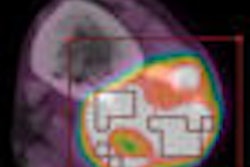Researchers from the University of California, Los Angeles (UCLA) are using PET/CT to help determine treatment response following chemotherapy.
The study, published in the April 15, 2009, issue of the journal Clinical Cancer Research, monitored 50 patients undergoing treatment for high-grade soft-tissue sarcomas. The patients were receiving neoadjuvant chemotherapy to shrink tumors prior to surgery.
With PET showing biochemical functions in real-time with the aid of FDG, researchers at UCLA's Jonsson Comprehensive Cancer Center used a benchmark of 35% percent reduction in a tumor's metabolic activity as an effective response to treatment.
Of the 50 patients in the study, researchers knew within a week that 28 patients did not respond to their initial chemotherapy treatment. That lack of tumor regression affords oncologists a quicker decision on whether to discontinue treatment or opt for another strategy, such as surgery.
Senior study author Dr. Fritz Eilber, an assistant professor of surgical oncology at UCLA and director of the sarcoma program at the center, noted that the findings will positively affect patients with inoperable tumors or metastatic disease by offering a quicker evaluation of treatment effectiveness.
Related Reading
FDG-PET/CT helps predict osteosarcoma survival, March 12, 2009
FDG-PET/CT recommended for staging Hodgkin's disease, December 19, 2008
FDG PET reveals osteosarcoma's response to chemotherapy, October 1, 1999
Copyright © 2009 AuntMinnie.com



















